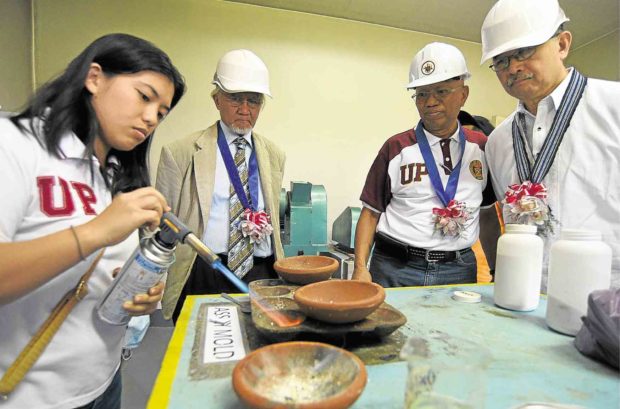Benguet gold plant draws few miners despite green tag

CLEAN GOLD This 2.8-gram gold nugget was extracted from raw ore at the integrated gold-copper mineral processing plant in Itogon, Benguet province, using an environment-friendly process. —EV ESPIRITU
LA TRINIDAD, BENGUET — What is arguably the country’s first “environment-friendly” gold processing plant has not been getting clients, due to a crackdown on pocket mining and opposition to the proposed “Minahang Bayan” (the people’s mine) in the mining towns of Benguet province.
Developed by scientists from the University of the Philippines, the integrated gold-copper mineral processing plant at Sitio Basil in Barangay Gumatdang in Itogon town has processed only 172 tons (157.85 metric tons) of gold ore since it started operating in January.
The plant harnesses practical technology so it no longer requires cyanide or mercury to dissolve rock and dirt from raw gold or copper.
Pocket mining
It can process 15 MT of gold ore each day, which represent 10-and-a-half-day’s work, said Norbert Cobaldez, assistant director for technical services in Cordillera of the Department of Science and Technology (DOST).
Article continues after this advertisementSmall-scale mining is a huge industry in Benguet. It employs over 100,000 pocket miners, most of them operate in Itogon and other Benguet towns of Mankayan and Tuba.
An average of 50 kilograms of gold is sold weekly to black market dealers in Baguio City, said Lomino Kaniteng, president of Benguet Federation of Small-Scale Miners Association.
A gram of high quality gold sells for P1,500 while a gram of inferior quality sells for P900, according to a local dealer. This translates to at least P2-billion gold sales annually.
But not one association operates a Minahang Bayan. So far, only 12 groups have been granted temporary small-scale mining permits or contracts by the provincial mining and regulatory board. The rest mine tunnels openly despite the absence of documents.
Mining laws require small-scale miners to work in a Minahang Bayan or in designated small-scale mining zones. Operations outside these areas are considered illegal.

Officials of the University of the Philippines and the Department of Science and Technology observe a stage in the processing of gold without the use of cyanide or mercury. —EV ESPIRITU
Permits
According to the DOST, many pocket miners will not try to haul their day’s take to the plant because they have not been issued ore transport permits.
“When caught without permit (to transport), their ores and vehicle will be confiscated and they will be charged. That’s why they are afraid of risking [their gold],” Cobaldez said.
The gold-copper processing project was pursued during the time of then Environment Secretary Gina Lopez “when there was a great chance for the realization of Minahang Bayan in Benguet,” he said.
A month before the processing plant was launched, Lopez visited an idle open-pit mine in Itogon which she wanted to develop into a model Minahang Bayan.
Consent
But the Mines and Geosciences Bureau returned the applications for this prospective mine because of the absence of a certification that the miners had secured the free prior and informed consent from indigenous peoples in the area.
Nancy Bantog, DOST Cordillera director, said the P25-million project would increase the gold recovery rate by 80 percent. Traditional gold processes, using cyanide and mercury, have been able to recover 40 to 70 percent of gold from dirt.
When “all systems are in place,” Cobaldez said, the plant will improve the revenues of small-scale miners. “But the biggest investment would be on its environmental impact. No more using cyanide and mercury,” he said.